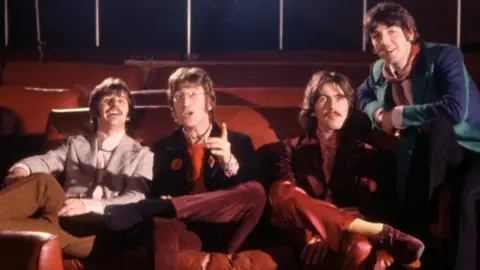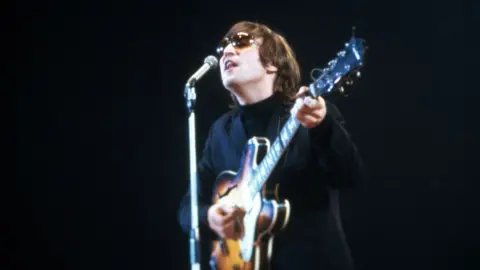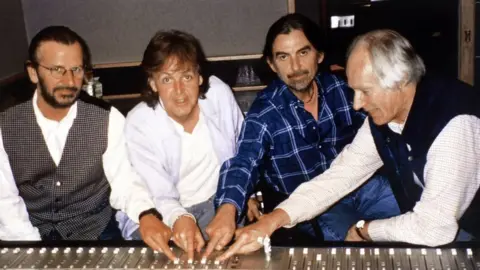Sir Paul McCartney says artificial intelligence has enabled a 'final' Beatles song
 Getty Images
Getty ImagesSir Paul McCartney says he has employed artificial intelligence to help create what he calls "the final Beatles record".
He told BBC Radio 4's Today programme the technology had been used to "extricate" John Lennon's voice from an old demo so he could complete the song.
"We just finished it up and it'll be released this year," he explained.
Sir Paul did not name the song, but it is likely to be a 1978 Lennon composition called Now And Then.
It had already been considered as a possible "reunion song" for the Beatles in 1995, as they were compiling their career-spanning Anthology series.
Sir Paul had received the demo a year earlier from Lennon's widow, Yoko Ono. It was one of several songs on a cassette labelled "For Paul" that Lennon had made shortly before his death in 1980.
Lo-fi and embryonic, the tracks were largely recorded onto a boombox as the musician sat at a piano in his New York apartment.
 Getty Images
Getty ImagesCleaned up by producer Jeff Lynne, two of those songs - Free As A Bird and Real Love - were completed and released in 1995 and 96, marking the Beatles' first "new" material in 25 years.
The band also attempted to record Now And Then, an apologetic love song that was fairly typical of Lennon's later career, but the session was quickly abandoned.
"It was one day - one afternoon, really - messing with it," Lynne recalled.
"The song had a chorus but is almost totally lacking in verses. We did the backing track, a rough go that we really didn't finish."
Sir Paul later claimed George Harrison refused to work on the song, saying the sound quality of Lennon's vocal was "rubbish".
"It didn't have a very good title, it needed a bit of reworking, but it had a beautiful verse and it had John singing it," he told Q Magazine.
"[But] George didn't like it. The Beatles being a democracy, we didn't do it."
 PA Media
PA MediaThere were also said to have been technical issues with the original recording, which featured a persistent "buzz" from the electricity circuits in Lennon's apartment.
In 2009, a new version of the demo, without the background noise, was released on a bootleg CD. Fans have speculated that this recording may not have been available in 1995, suggesting it was stolen from his apartment, along with other personal effects, after his death.
In the intervening years, Sir Paul has repeatedly talked about his desire to finish the song.
"That one's still lingering around," he told a BBC Four documentary on Jeff Lynne in 2012. "So I'm going to nick in with Jeff and do it. Finish it, one of these days."
'Ropey cassette'
It would seem that technology has now afforded the musician a chance to achieve that goal.
The turning point came with Peter Jackson's Get Back documentary, where dialogue editor Emile de la Rey trained computers to recognise the Beatles' voices and separate them from background noises, and even their own instruments, to create "clean" audio.
The same process allowed Sir Paul to "duet" with Lennon on his recent tour, and for new surround sound mixes of the Beatles' Revolver album to be created last year.
"He [Jackson] was able to extricate John's voice from a ropey little bit of cassette," Sir Paul told Radio 4's Martha Kearney.
"We had John's voice and a piano and he could separate them with AI. They tell the machine, 'That's the voice. This is a guitar. Lose the guitar'.
"So when we came to to make what will be the last Beatles' record, it was a demo that John had [and] we were able to take John's voice and get it pure through this AI.
"Then we can mix the record, as you would normally do. So it gives you some sort of leeway."
However, the musician admitted that other applications of AI gave him cause for concern.
"I'm not on the internet that much [but] people will say to me, 'Oh, yeah, there's a track where John's singing one of my songs', and it's just AI, you know?
"It's kind of scary but exciting, because it's the future. We'll just have to see where that leads."
The star was talking to Radio 4 ahead of the launch of a new book and accompanying photography exhibition at the National Portrait Gallery.
Titled Eyes Of The Storm, the project features portraits taken by Sir Paul on his own camera, between December 1963 and February 1964, as the Beatles were catapulted to global fame.
